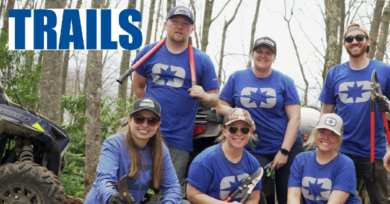Increasing sit-downs boosts sales
 Editor’s note: This is the fifth blog in a series about asking for the sale. In this installment, Steve Lemco explains how easy it is to get a customer to sit down and discuss a sale.
Editor’s note: This is the fifth blog in a series about asking for the sale. In this installment, Steve Lemco explains how easy it is to get a customer to sit down and discuss a sale.
Before worrying about solving customers’ objections or the price issue, concentrate on developing relationships; do your best to become a friend in the business. By doing that, many times there won’t be any problems, and you can help guide customers through a purchase.
One of the best ways to build a relationship is to say, at the right time, “Would you like to see how easy it is to take one home today?” If the answer is “Yes,” you will sit down with your customer to fill out the purchase order or, at least, a request to buy. If the answer is “No,” and your customer says, “I’ll be back. Do you have a card?” you take the same route and sit down in your office or at your desk with your customer.
It’s important that you take time to sit down with every customer you believe is in the market for your product, which should be most of them. This is why I prefer to leave my cards at my desk. It’s not very hard to get a friend to walk over to your desk to get a card and talk about a few things — a few very important, truthful things, the most important being “What’s stopping you from buying today?”
Before we move into finding the true objection, let’s discuss sitting at the desk a bit more. Almost every time I give a seminar and say that at least 80 percent of your customers should sit at your desk, I hear, “No way.” They say, “Maybe that works in the big cities, but this is a little town, and you can’t do that high of a percentage with our customers.” When I’m in the big city, I hear how it might work in hick towns, but the city folks would never go for it. No matter where I am, I always hear you can’t do that high of a percentage in this town. My customers would never go for it.
I don’t get it. What do they mean My customer won’t go for it? Go for what? I just want to sit down with my friend and make sure we’ve gone over everything. It’s no big deal.
To prove my point, I have fun with groups. I tell them I’ve been secretly working on a new pay plan with their manager. Since they didn’t believe they were capable of getting 80 percent of their customers to sit down, we were going to convert them to liners and hire closers to come in behind them and close the sale. Their only job would be to greet customers, find out what they are interested in and sit them down in the office. When that happens, the closer will take his shot at making the deal.
I like to pause for a second or two at this point and look at the daggers in their eyes as they stare back at me. I don’t pause for too long because I get scared I might start actually feeling those daggers. So I tell them the good news. I explain that after the closer comes into the office, the salesperson who sat his customer down goes to his manager’s office and gets a $100 bill. Every time one of their customers sits down at the salesperson’s desk, they get $100. Even if the customer doesn’t try to buy, the salesperson still gets paid.
By this time the daggers are no longer there. They’re replaced with cash register eyes. I can almost hear the sounds of bells as they ring up their sit-downs. I then ask how much money they would average if they greeted 10 customers a day. I hear $1,000 from most of them, a few say $900, and one or two say $800.
I pause again, then look at them funny.
It takes a second or two.
Then they start laughing.
Their excuses flew out the window. They went from being negative about the 80 percent sit-down to positive to the point that they were saying they could do better than what I said they could. Why? Because they tapped into the power they always had. They just went from a mowing-the-lawn attitude to a playing-a-game attitude. They tapped into their Gotta-Wanna.They wanted to sit those customers down at their desks, and that made all the difference.
Unfortunately for them, I was kidding about the pay plan. But it was fortunate for them if they understood what just took place and committed to applying what they just realized.
Steve Lemco is the youngest brother of the late Ed Lemco and has been doing sales training and hiring for motorcycle dealers since 1983. He is the author of two sales books, the new “Motorcycle Sales Made Easy” and “You Gotta-Wanna.” Steve has trained in every state in the U.S., as well as England, France, Australia and New Zealand. Steve incorporates motivational boards and games along with his training and hiring because he believes the best way to get the job done is to make it fun.
Contact: stevelemco@aol.com
Website: www.stevelemco.com
Phone: 253/826-6110








